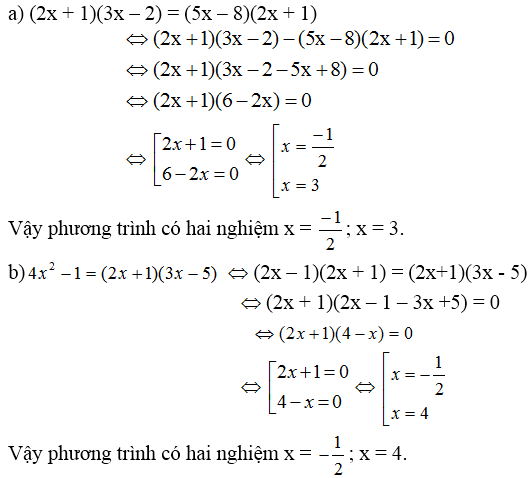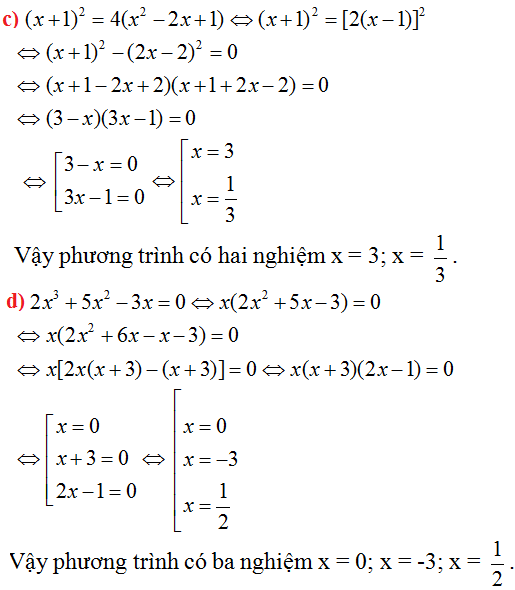Hãy nhập câu hỏi của bạn vào đây, nếu là tài khoản VIP, bạn sẽ được ưu tiên trả lời.

Đặt \(u=x^2-x\)
Phương trình trở thành \(u^2-4u+4=0\)
\(\Leftrightarrow\left(u-2\right)^2=0\)
\(\Leftrightarrow u-2=0\)
\(\Rightarrow x^2-x=2\)
\(\Rightarrow x^2-x-2=0\)
Ta có \(\Delta=1^2+4.2=9,\sqrt{\Delta}=3\)
\(\Rightarrow\orbr{\begin{cases}x=\frac{1+3}{2}=2\\x=\frac{1-3}{2}=-1\end{cases}}\)
Đặt \(2x+1=w\)
Phương trình trở thành \(w^2-w=2\)
\(\Rightarrow\orbr{\begin{cases}w=2\\w=-1\end{cases}}\)
\(\Leftrightarrow\orbr{\begin{cases}2x+1=2\\2x+1=-1\end{cases}}\)
\(\Leftrightarrow\orbr{\begin{cases}x=\frac{1}{2}\\x=-1\end{cases}}\)

Bài 3:
a) \(\left(x-6\right).\left(2x-5\right).\left(3x+9\right)=0\)
\(\Leftrightarrow\left(x-6\right).\left(2x-5\right).3.\left(x+3\right)=0\)
Vì \(3\ne0.\)
\(\Leftrightarrow\left[{}\begin{matrix}x-6=0\\2x-5=0\\x+3=0\end{matrix}\right.\Leftrightarrow\left[{}\begin{matrix}x=6\\2x=5\\x=-3\end{matrix}\right.\Leftrightarrow\left[{}\begin{matrix}x=6\\x=\frac{5}{2}\\x=-3\end{matrix}\right.\)
Vậy phương trình có tập hợp nghiệm là: \(S=\left\{6;\frac{5}{2};-3\right\}.\)
b) \(2x.\left(x-3\right)+5.\left(x-3\right)=0\)
\(\Leftrightarrow\left(x-3\right).\left(2x+5\right)=0\)
\(\Leftrightarrow\left[{}\begin{matrix}x-3=0\\2x+5=0\end{matrix}\right.\Leftrightarrow\left[{}\begin{matrix}x=3\\2x=-5\end{matrix}\right.\Leftrightarrow\left[{}\begin{matrix}x=3\\x=-\frac{5}{2}\end{matrix}\right.\)
Vậy phương trình có tập hợp nghiệm là: \(S=\left\{3;-\frac{5}{2}\right\}.\)
c) \(\left(x^2-4\right)-\left(x-2\right).\left(3-2x\right)=0\)
\(\Leftrightarrow\left(x^2-2^2\right)-\left(x-2\right).\left(3-2x\right)=0\)
\(\Leftrightarrow\left(x-2\right).\left(x+2\right)-\left(x-2\right).\left(3-2x\right)=0\)
\(\Leftrightarrow\left(x-2\right).\left(x+2-3+2x\right)=0\)
\(\Leftrightarrow\left(x-2\right).\left(3x-1\right)=0\)
\(\Leftrightarrow\left[{}\begin{matrix}x-2=0\\3x-1=0\end{matrix}\right.\Leftrightarrow\left[{}\begin{matrix}x=2\\3x=1\end{matrix}\right.\Leftrightarrow\left[{}\begin{matrix}x=2\\x=\frac{1}{3}\end{matrix}\right.\)
Vậy phương trình có tập hợp nghiệm là: \(S=\left\{2;\frac{1}{3}\right\}.\)
Chúc bạn học tốt!

\(\left(x-5\right)\left(x-1\right)=2x\left(x-1\right)\)
\(\Leftrightarrow\left(x-1\right)\left(x-5-2x\right)=0\)
\(\Leftrightarrow\left(x-1\right)\left(x+5\right)=0\)
\(\Leftrightarrow\orbr{\begin{cases}x=1\\x=-5\end{cases}}\)
Vậy............
\(5\left(x+3\right)\left(x-2\right)-3\left(x+5\right)\left(x+2\right)=0\)
\(\Leftrightarrow5\left(x^2+x-6\right)-3\left(x^2+7x+10\right)=0\)
\(\Leftrightarrow2x^2-16x-60=0\)
\(\Leftrightarrow x^2-8x-30=0\)
làm tiếp nhé!!!!!

\(a,2x\left(x-3\right)+5\left(x-3\right)=0\)
\(\Leftrightarrow\left(2x+5\right)\left(x-3\right)=0\)
\(\Leftrightarrow\orbr{\begin{cases}2x+5=0\\x-3=0\end{cases}}\Leftrightarrow\orbr{\begin{cases}2x=-5\\x=3\end{cases}}\Leftrightarrow\orbr{\begin{cases}x=-\frac{5}{2}\\x=3\end{cases}}\)
Vậy .........
\(b,\left(x^2-4\right)+\left(x-2\right)\left(3-2x=0\right)\)
\(\Leftrightarrow x^2-4-2x^2+7x-6=0\)
\(\Leftrightarrow-x^2+7x-10=0\)
\(\Leftrightarrow-\left(x-5\right)\left(x-2\right)=0\)
\(\Leftrightarrow\orbr{\begin{cases}x=5\\x=2\end{cases}}\)
Vậy ..................
\(c,x^3-3x^2+3x-1=0\)
\(\Leftrightarrow\left(x-1\right)^3=0\)
\(\Leftrightarrow x=1\)
\(d,x\left(2x-7\right)-4x+14=0\)
\(\Leftrightarrow2x^2-7x-4x+14=0\)
\(\Leftrightarrow2x^2-11x+14=0\)
\(\Leftrightarrow\left(2x-7\right)\left(x-2\right)=0\)
\(\Leftrightarrow\orbr{\begin{cases}x=\frac{7}{2}\\x=2\end{cases}}\)
Vậy ............
\(e,\left(2x-5\right)^2-\left(x+2\right)^2=0\)
\(\Leftrightarrow4x^2-20x+25-x^2-4x-4=0\)
\(\Leftrightarrow3x^2-24x+21=0\)
\(\Leftrightarrow3\left(x-7\right)\left(x-1\right)=0\)
\(\Leftrightarrow\orbr{\begin{cases}x-7=0\\x-1=0\end{cases}}\Leftrightarrow\orbr{\begin{cases}x=7\\x=1\end{cases}}\)
Vậy .....................
\(f,x^2-x-\left(3x-3\right)=0\)
\(\Leftrightarrow x^2-x-3x+3=0\)
\(\Leftrightarrow x^2-4x+3=0\)
\(\Leftrightarrow\left(x-3\right)\left(x-1\right)=0\)
\(\Leftrightarrow\orbr{\begin{cases}x-3=0\\x-1=0\end{cases}}\Leftrightarrow\orbr{\begin{cases}x=3\\x=1\end{cases}}\)
Vậy ..............

a. \(9\left(x+2\right)-3\left(x+2\right)=0\)
\(\Leftrightarrow9x+18-3x-6=0\)
\(\Leftrightarrow6x+12=0\)
\(\Leftrightarrow x=-2\)
e. \(\left(2x-1\right)^2-45=0\)
\(\Leftrightarrow4x^2-2x+1-45=0\)
\(\Leftrightarrow4x^2-2x-44=0\)
Đến đó tự giải tiếp nha!
c. \(2\left(2x-5\right)-3x=0\)
\(\Leftrightarrow4x-10-3x=0\)
\(\Leftrightarrow x-10=0\)
\(\Leftrightarrow x=10\)
g. \(2x^2-6x=0\)
\(\Leftrightarrow2x\left(x-3\right)=0\)
\(\Leftrightarrow\left[{}\begin{matrix}2x=0\\x-3=0\end{matrix}\right.\Leftrightarrow\left[{}\begin{matrix}x=0\\x=3\end{matrix}\right.\)

1: =>2x-5=4 hoặc 2x-5=-4
=>2x=9 hoặc 2x=1
=>x=9/2hoặc x=1/2
2: \(\Leftrightarrow\left|2x+1\right|=\dfrac{3}{4}-\dfrac{7}{8}=\dfrac{-1}{8}\)(vô lý)
3: \(\Leftrightarrow\left|5x-3\right|=x+5\)
\(\Leftrightarrow\left\{{}\begin{matrix}x>=-5\\\left(5x-3-x-5\right)\left(5x-3+x+5\right)=0\end{matrix}\right.\)
\(\Leftrightarrow\left\{{}\begin{matrix}x>=-5\\\left(4x-8\right)\left(6x+2\right)=0\end{matrix}\right.\Leftrightarrow x\in\left\{2;-\dfrac{1}{3}\right\}\)

e sẽ cố gắng !!!
\(3x-15=2x\left(x-5\right)\)
\(3x-15=2x^2-10x\)
\(3x-15-2x^2+10x=0\)
\(13x-15-2x^2=0\)
\(x\left(13-2x\right)-15=0\)
\(\Rightarrow\orbr{\begin{cases}x=0\\13-2x-15=0\end{cases}\Rightarrow\orbr{\begin{cases}x=0\\-2-2x=0\end{cases}\Rightarrow}\orbr{\begin{cases}x=0\\2x=-2\end{cases}\Rightarrow}\orbr{\begin{cases}x=0\\x=-1\end{cases}}}\)
\(f,x\left(2x-7\right)-4x+14=0\)
\(2x^2-7x-4x+14=0\)
\(2x^2-11x+14=0\)
\(x\left(2x-11\right)=-14\)
\(\Rightarrow\orbr{\begin{cases}x=-14\\2x-11=-14\end{cases}\Rightarrow\orbr{\begin{cases}x=-14\\2x=-3\end{cases}\Rightarrow}\orbr{\begin{cases}x=-14\\x=-\frac{3}{2}\end{cases}}}\)

a)(2x+1)(3x-2)=(5x-8)(2x+1)
⇔(2x+1)(3x-2)-(5x-8)(2x+1)=0
⇔(2x+1)(3x-2-5x+8)=0
⇔(2x+1)(-2x+6)=0
⇔2x+1=0 hoặc -2x+6=0
1.2x+1=0⇔2x=-1⇔x=-1/2
2.-2x+6=0⇔-2x=-6⇔x=3
phương trình có 2 nghiệm x=-1/2 và x=3

a) 0,75x(x + 5) = (x + 5)(3 - 1,25x)
<=> 0,75x(x + 5) - (x + 5)(3 - 1,25x) = (x + 5)(3 - 1,25x) - (x + 5)(3 - 1,25x)
<=> 0,75x(x + 5) - (x + 5)(3 - 1,25x) = 0
<=> (x + 5)(0,75 + 1,25x - 3) = 0
<=> (x + 5)(2x - 3) = 0
<=> x + 5 = 0 hoặc 2x - 3 = 0
<=> x = -5 hoặc x = 3/2
b) 4/5 - 3 = 1/5x(4x - 15)
<=> -11/5 = x(4x - 15)/5
<=> -11 = x(4x - 15)
<=> -11 = 4x2 - 15x
<=> 11 + 4x2 - 15x = 0
<=> 4x2 - 4x - 11x + 11 = 0
<=> 4x(x - 1) - 11(x - 1) = 0
<=> (4x - 11)(x - 1) = 0
<=> 4x - 11 = 0 hoặc x - 1 = 0
<=> x = 11/4 hoặc x = 1
c) \(\left(x-3\right)-\frac{\left(x-3\right)\left(2x-5\right)}{6}=\frac{\left(x-3\right)\left(3-x\right)}{4}\)
<=> 12x - 36 - 2(x - 3)(2x - 5) = 3(x - 3)(3 - x)
<=> 12x - 36 - 4x2 + 10x + 12x - 30 = 9x - 3x2 - 27 + 9x
<=> 34x - 66 - 4x2 = 18x - 3x2 - 27
<=> 34x - 66 - 4x2 - 18x + 3x2 + 27 = 0
<=> 16x - 39x - x2 = 0
<=> x2 - 16x + 39x = 0
<=> (x - 3)(x - 13) = 0
<=> x - 3 = 0 hoặc x - 13 = 0
<=> x = 3 hoặc x = 13
d) \(\frac{\left(3x+1\right)\left(3x-2\right)}{3}+5\left(3x+1\right)=\frac{2\left(2x+1\right)\left(3x+1\right)}{3}+2x\left(3x+1\right)\)
<=> (3x + 1)(3x - 2) + 15(3x + 1) = 2(2x + 1)(3x + 1) + 6x(3x + 1)
<=> 9x2 - 6x + 3x - 2 + 45x + 15 = 12x3 + 4x + 6x + 2 + 18x2 + 6x
<=> 9x2 + 42x + 13 = 30x2 + 16x + 2
<=> 9x2 + 42x + 13 - 30x2 - 16x - 2 = 0
<=> -21x2 + 26x + 11 = 0
<=> 21x2 - 26x - 11 = 0
<=> 21x2 + 7x - 33x - 11 = 0
<=> 7x(3x + 1) - 11(3x + 1) = 0
<=> (7x - 11)(3x + 1) = 0
<=> 7x - 11 = 0 hoặc 3x + 1 = 0
<=> x = 11/7 hoặc x = -1/3

